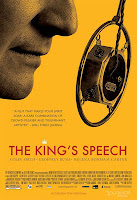The King's Speech / Le Discours d'un roi
A king’s speech
It is apparently “Oscar season”, and I realised that I haven’t seen many of the nominated films yet.
I am going away for work next week and I will have a big longer than 20 hours to catch up with films on the plane (The list of films that should be available includes Argo and Lincoln, so that basically covers the main contenders).
The only film I think I have seen that’s on any of the lists this year is A Royal Affair, which I really liked, even though I think The Hunt would have been a better candidate, and I haven’t seen Amour because I had to work when the film was shown at my tiny local cinema (Teleconferences from 8 to 10 pm are no fun). (And after I checked on the official Oscars website I realise I have to add Anna Karenina, Skyfall, and Snow White to the list of the few films I have seen)
 I was looking at the previous winners, and realised that in the past 3 years I haven’t even bothered with watching most of the nominees for best picture, that's how boring I think the Oscars have become.
I was looking at the previous winners, and realised that in the past 3 years I haven’t even bothered with watching most of the nominees for best picture, that's how boring I think the Oscars have become.
The King’s Speech is, surprisingly, one film I have seen. Once again, my expectations were quite high because of all the fantastic reviews it received, and for me, it was a good film, but not a great one.
It is apparently “Oscar season”, and I realised that I haven’t seen many of the nominated films yet.
I am going away for work next week and I will have a big longer than 20 hours to catch up with films on the plane (The list of films that should be available includes Argo and Lincoln, so that basically covers the main contenders).
The only film I think I have seen that’s on any of the lists this year is A Royal Affair, which I really liked, even though I think The Hunt would have been a better candidate, and I haven’t seen Amour because I had to work when the film was shown at my tiny local cinema (Teleconferences from 8 to 10 pm are no fun). (And after I checked on the official Oscars website I realise I have to add Anna Karenina, Skyfall, and Snow White to the list of the few films I have seen)
 I was looking at the previous winners, and realised that in the past 3 years I haven’t even bothered with watching most of the nominees for best picture, that's how boring I think the Oscars have become.
I was looking at the previous winners, and realised that in the past 3 years I haven’t even bothered with watching most of the nominees for best picture, that's how boring I think the Oscars have become.The King’s Speech is, surprisingly, one film I have seen. Once again, my expectations were quite high because of all the fantastic reviews it received, and for me, it was a good film, but not a great one.
I was slightly bothered when I saw the French title, “Le Discours d'un roi”.
Why does it bother me? Well. It’s all about grammar.
 |
| They didn't even keep the little crowny thing... |
For example(s): Imagine telling someone you live with:
- “A cat scratched me” versus “The cat scratched me”. In the first case, you would be talking about an unknown cat. In the second case, the house cat.
- “I'm late because a car broke down on the motorway” vs “I'm late because the car broke down”. In the first case, you don’t know which car broke down, in the second it’s your car.
This does not work when a means one. There is clearly a difference between "There's an (one) apple on the table" and "Would you like an apple?". In the first case, you're counting, in the second, you're offering any apple (but just the one?).
When you talk about the Moon, you know it’s the big ball in the sky you can see most nights. Wouldn’t it be weird to start talking about it as “a Moon”? But you wouldn’t say Titan is the moon of Saturn, because it’s not true: it is one of the moons, not the only one. It is "a" moon.
Complicated? It can be for native English speakers because you never have to think about it. Imagine trying to learn that stuff!
 |
| A certain bromance... |
I hope you’re still with me on this.
When you talk about THE King’s Speech, you know which King it is. If you don’t, you will by the end of the film because it is what the whole thing is aiming at: the King of England being able to deliver his speech without stuttering.
If you say “A King’s Speech”, it could be any king, anywhere, any time. The king of Siam? Maybe? Of Belgium? Who knows?
Maybe it’s because that a/the thing does not work in French, you think? No it’s not. It works the same way. There is a marked difference between un(e) and le/la.
They could have easily named the film "Le discours du roi".
So there it is , the reason (a reason?) why this translation sucks, and the proof that changing a tiny little word can change the whole context.
Note:
I was going to illustrate with one famous kid’s song from the late 70s (Be warned of any potential trauma caused by clicking on the link) which goes “Ce matin un lapin / A tué un chasseur / C'était un lapin qui / Avait un fusil” (translated as “This morning a rabbit killed a hunter. This was a rabbit that had a gun” and I grew up ok, and I never said these were great lyrics). This is talking about a nondescript rabbit and a nondescript hunter.And I realised this didn't illustrate anything, or maybe just show how my stupid brain works sometimes.
And thanks so much to Mrs S. for proofreading the linguistics lesson :)


Comments
Post a Comment